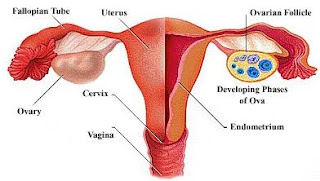8 SIGNS OF AN UNHEALTHY VAGINA
1) ITCHING AND BURNING: constant itching and burning sensation indicates the onset of a number of vaginal infections. When the harmful bacteria outnumber the good bacteria in the vagina, the imbalance manifests itself through the physical symptom of itching and burning. A certain amount of yeast is essential to ward off harmful bacteria in the vaginal area. However, an over production of yeast can result in a yeast infection, causing symptoms that include itching and burning.
Itching can also be a reaction to chemicals or ingredients in soaps, creams, contraceptive foams and prepackaged douching mixtures. These mixtures can alter the bacterial balance and acidity of the vagina that protect it against infections.
2) SMELLY DISCHARGE: It’s unlikely for your vagina to smell like a bed of roses, but if you notice a recurrent strong odor, one that even transfers to your undergarments, it might be a sign of an infection. An excess of harmful bacteria causes bacterial vaginosis. A foul-smelling vaginal discharge is often the first and most common symptom of this infection.
Itching can also be a reaction to chemicals or ingredients in soaps, creams, contraceptive foams and prepackaged douching mixtures. These mixtures can alter the bacterial balance and acidity of the vagina that protect it against infections.
2) SMELLY DISCHARGE: It’s unlikely for your vagina to smell like a bed of roses, but if you notice a recurrent strong odor, one that even transfers to your undergarments, it might be a sign of an infection. An excess of harmful bacteria causes bacterial vaginosis. A foul-smelling vaginal discharge is often the first and most common symptom of this infection.
A “FISHY ODOR” is one of the major symptoms of bacterial vaginosis, according to a 2011 study published in the International Journal of Women’s Health. This discharge may especially occur after intercourse. Pregnant women who contract bacterial vaginosis run a risk of delivering their baby prematurely, according to the Centers for Disease Control and Prevention. It also increases the risk of contracting sexually transmitted diseases (STDs), including HIV, and may sometimes lead to pelvic inflammatory disease. Therefore, seek medical attention right away if you notice a vaginal odor.
3) DISCOLORATION & EXCESSIVE DISCHARGE: Vaginal discharge is the body’s natural mechanism to keep the vagina lubricated and flush out harmful bacteria. Normal vaginal discharge – clear or white and does not give off a bad odor. A brown or red discharge that occurs right after a menstrual cycle is usually not a matter of concern. However, if you experience brown or red discharge on normal days between periods, seek medical attention as it could be indicative of cervical cancer. If it occurs during early pregnancy, it could signify a miscarriage. A green or yellow, smelly and froth-like discharge is not normal and may be a sign of trichomoniasis, an STD. A watery white, gray or yellow discharge might be a symptom of bacterial vaginosis. While the amount of discharge differs from woman to woman, recurrent and excessive discharge may also indicate bacterial vaginosis. Seek medical attention.
4) ABNORMAL BLEEDING: if you experience bleeding between periods, it is a cause for alarm. A menstrual cycle that lasts abnormally long may also be a sign that there’s a problem. If you have reached menopause (absence of menstruation for 12 months) but are still experiencing bleeding and spotting, consult your gynecologist immediately. Post-menopausal bleeding is a crucial symptom and must be immediately diagnosed to prevent its transformation into a malignant disease, according to a 2013 study published in the International Journal of Reproduction, Contraception, Obstetrics and Gynecology. Some women may also notice the passage of blood clots through the vagina post-menopause – another warning sign of an unhealthy vagina and related diseases, such as endometrial polyps (growths in the inner lining of the uterus) or endometrial or cervical cancer.
5) BLEEDING DURING OR AFTER INTERCOURSE: while it is common for women who are new to sexual intercourse to experience bleeding, medical attention must be sought if it is a recurring issue in young women. Bleeding during or after intercourse in a woman of any age could indicate a vaginal infection, a vaginal tear (induced by childbirth), STDs like chlamydia or vaginal dryness. The friction produced during intercourse can irritate dry skin and cause spotting. If you have gone through menopause and experience bleeding during or after intercourse, it is a great cause for worry as it could indicate cervical cancer.
Therefore, any abnormal bleeding during or after intercourse needs medical attention as it could have long-lasting and grave consequences.
6) BUMPS OR BLISTERS: if you notice a bump on your outer vagina, it might be a symptom of vaginal or vulvar cancer. Vaginal cancer remains one of the least-discussed cancers among women today. Although it is not as common as other cancers in women, a study published in 2000 in The Journal of Reproductive Medicine reported a significant increase in the number of young women contracting vulvar cancer since 1980. A cancerous bump may begin as a mole but change color and texture to transform into a hard bump or lesion. The bump can occur anywhere on the outer vagina, although it is most commonly located near the clitoris. It is usually black or dark brown, but it can also be pink, red or white. Sores and blisters might be symptoms of STDs, such as genital herpes. Seek immediate medical attention if you notice a bump on your outer vagina.
7) PAINFUL URINATION: painful urination is most commonly associated with urinary track infections, it can also be a major symptom of a vaginal infection like a yeast infection or bacterial vaginosis. A vaginal infection can occur due to the use of products like creams and soaps that contain certain harmful chemicals. It may also occur from using a chemical-based douche or leaving a tampon in too long. Vaginal infections often cause the vagina to become inflamed and hurt when urine passes through it. Painful urination can also be a symptom of various STDs, including chlamydia and genital herpes. Apart from being painful, the urination may also be inflammatory and the person may suffer constant vaginal itching. If you experience pain while urinating, seek medical attention.
8)SEEING IRREGULAR PERIODS: Skipping your period once in a while is fine but if you skip your period frequently, it is important to see a gynecologist. It could be one of the first indications of an issue with your reproductive system.Occasional missed periods are often linked to issues like excessive weight loss or gain, eating disorders like anorexia or bulimia, anemia, a strenuous exercise routine, breastfeeding, emotional stress, some kind of illness, too much traveling, use of unsuitable birth control medication and illegal drugs, even asthma and hay fever.
However, conditions like polycystic ovary syndrome, menopause, or hormonal imbalances can also trigger this problem. So, do see your gynecologist to find out the exact cause. At your appointment, your gynecologist will first rule out the possibility of pregnancy. If the pregnancy report is negative, other tests will be done. Depending upon the cause, treatment will be planned to correct the problem and prevent it from recurring.
Drop your comments below and please do share!!!



Comments
Post a Comment